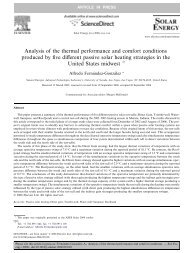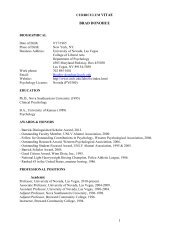2013 Conference Proceedings - University of Nevada, Las Vegas
2013 Conference Proceedings - University of Nevada, Las Vegas
2013 Conference Proceedings - University of Nevada, Las Vegas
- No tags were found...
Create successful ePaper yourself
Turn your PDF publications into a flip-book with our unique Google optimized e-Paper software.
(SCK), or knowledge <strong>of</strong> mathematics specifically for teaching, and (c) mathematics on thehorizon. For example, knowing how to multiply 35 x 25 using a standard algorithm is CCKexpected <strong>of</strong> most adults. Teachers, on the other hand, also need to know how to detectmathematical errors, determine if methods and solutions different from the ones they are familiarwith are valid, ask appropriate questions to probe student thinking and correct misconceptions,and use representations to make connections, all examples <strong>of</strong> SCK. Pedagogical contentknowledge includes (a) knowledge <strong>of</strong> content and students, (b) knowledge <strong>of</strong> content andteaching, and (c) knowledge <strong>of</strong> curriculum. Ma (1999) identified three periods in whichteachers’ subject matter knowledge develops (a) during their own schooling experiences(students <strong>of</strong> mathematics, K-12 and college-level), (b) during a teacher preparation program, and(c) while teaching students in the classroom. Although pre-service teachers have limited timeand experience in the classroom working directly with students, CCK and SCK can developwithout direct student interactions.Second, teacher behavior and learning is influenced by subject matter knowledge, andattitudes and beliefs towards mathematics, within a social context (Van der Sandt, 2007). Whenconsidering teacher preparation, existing knowledge and beliefs are critical factors indetermining what and how teachers learn from educational experiences and these beliefs aredifficult to change (Kajander, 2010). Furthermore, the level <strong>of</strong> mathematical competence <strong>of</strong> preserviceteachers prior to entering the preparation program greatly influences the focus <strong>of</strong> theprogram itself. If pre-service teachers do not possess mathematical competence prior to enteringthe teacher preparation program, then teacher educators must dedicate methods instructional timeto school-level mathematics. Teachers in the U.S. are caught in a cycle <strong>of</strong> low-qualitymathematics learning (Ball, 2003; Ma, 1999).Although studies with pre-service teachers have documented growth in MKT withinmathematics content courses designed for teachers (e.g. Mathematics Education <strong>of</strong> ElementaryTeachers (ME.ET), 2009; Welder, 2007), there have been limited studies on the impact <strong>of</strong> themathematics methods course on the development <strong>of</strong> MKT. By design, the objectives <strong>of</strong> amathematics methods course focus on both content and pedagogical content knowledge.Therefore, the purpose <strong>of</strong> this study was to investigate the impact <strong>of</strong> a one-semester mathematicsmethods course, and follow-up full time student teaching assignment on the development <strong>of</strong>MKT. The focus in algebraic reasoning, in particular two underlying components <strong>of</strong> algebraic<strong>Proceedings</strong> <strong>of</strong> the 40 th Annual Meeting <strong>of</strong> the Research Council on Mathematics Learning <strong>2013</strong> 34




